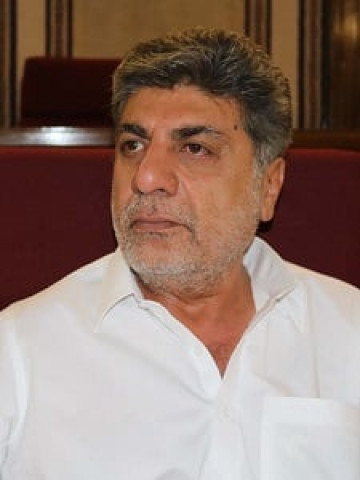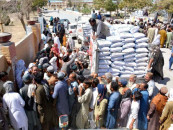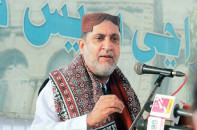Minister vows to resolve Kirthar canal water issue with Sindh
Magsi says Sindh government is blatantly violating the 1991 water treaty

Less water supply in Kirthar canal affects the green belt of Balochistan, the minister says. PHOTO: FILE
“Seventy per cent of the population in the province works in the agricultural fields. Less water supply in Kirthar canal affects the green belt of Balochistan,” said the minister during a meeting with former federal minister Changez Khan Jamali on Friday.
NAB seeks record of Rs10b Quetta water project
“The provincial government will resolve the water issue with the government of Sindh because decreased water supply in Kirthar canal is harming our agriculture industry,” said Magsi.
The former federal minister informed Magsi about the farmers’ woes in Naseerabad, saying the stoppage of province’s due share of water by the Sindh government has increased their (farmers) miseries.
“The Sindh government has been blatantly violating the 1991 water treaty under which it supplies water to the Kirthar canal,” said the minister, adding that thousands of acres of agricultural land in Balochistan was not receiving water due to illicit stoppage by the Sindh government.
As Quetta’s population rises, so do the water woes of people
Additional Chief Secretary for Planning and Development Sajjad Ahmed Bhutta briefed the provincial minister on development projects in Naseerabad under the provincial Public Sector Development Programme.
Magsi directed the planning and development department to commence collective-based development projects in Balochistan in order to provide relief to major parts of the province.
In July, caretaker Balochistan Chief Minister Alauddin Marri said the province was facing the worst kind of water shortage as Sindh had stopped 70 per cent of “our water” supply.
Addressing a seminar on ‘Water scarcity in Balochistan and Way Forward through Strategic Action, Conservation and Public Awareness’, Marri said, “We are witnessing the worst water crisis. We need collective efforts to save water for our future generation.”
Favouritism hindering water-supply projects in Balochistan
Marri said, “The water level in dams has been decreasing rapidly but we haven’t planned any new dams to store rainwater. Unfortunately, we are among those nations which always plan after witnessing devastation.”
Marri lamented the allocation of funds in the Public Sector Development Programme for setting up new tube wells instead of new dams.
He said, “We are busy in politics on the issue of dams, while our country, particularly our province, has been facing the worst water crisis. We still have time to build new dams as after a couple of years new dams won’t be beneficial.”



















COMMENTS
Comments are moderated and generally will be posted if they are on-topic and not abusive.
For more information, please see our Comments FAQ